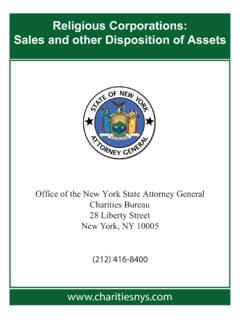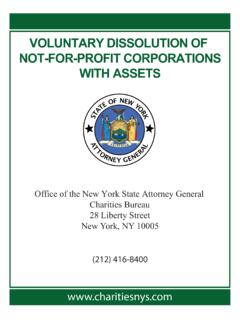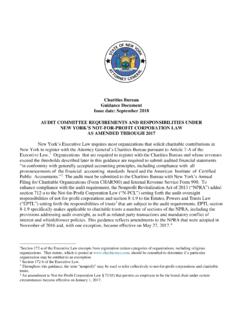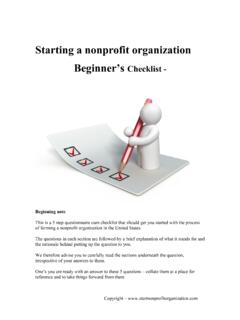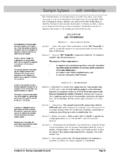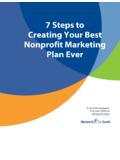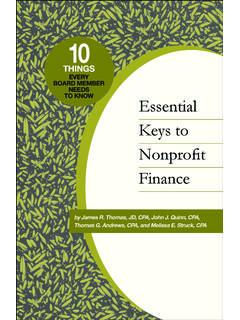Transcription of RIGHT FROM THE START: RESPONSIBILITIES of DIRECTORS of …
1 RIGHT FROM THE start : RESPONSIBILITIES of DIRECTORS ofNOT-FOR-PROFIT CORPORATIONS Office of the New York State Attorney GeneralCharities Bureau28 Liberty StreetNew York, NY 10005(212) omRIGHT FROM THE start : RESPONSIBILITIES of DIRECTORS of N0T-FOR-PROFIT CORPORATIONSO ffice of the NYS Attorney GeneralChar ities itiesn Doc ument 2015 -6, V. d ate: May15,2015 The Charities Bureau of the Office of the New York State Attorney General draftedthis guidance to assist c urrent a nd fut ur e boards of director s of n ot-for-pr ofit cor porationsand trustees of charitabl e t rusts t o understand and carry out t he ir f iduciary RESPONSIBILITIES tothe orga ni zations the y serve . The i nf or mation in thi s booklet reflects cha nges t o the N ot-for-Prof it Cor poration Law t ha t w ere included in the Nonprof it Revitalization Act of e organi zations contribute e normously t o our society. They e ducate our children, care for t he si ck, find cures for disease, preserve our literature, art a nd music for us and fut ure ge ne rations, house t he homeless, pr otect t he e nvironment a nd muc h more.
2 The f iduciaries of t hose c haritabl e orga ni zations are responsibl e for mana ging a nd preserving t he charitabl e assets t ha t benefit all of u s. Wha tever the ir mission or si ze, a ll or ga ni zations should have policies and procedures e st ablished so tha t ( 1) members of the ir boards underst and the ir f iduciary RESPONSIBILITIES , (2) a ssets are mana ged properly and (3) t he charitabl e purposes are carried out. A f ailure to meet t he se obliga tions is a breach of f iduciary duty and can result in fina nc ial a nd other liability f or t he board of di rector r ead thi s booklet carefully. It c ontains gene ral i nf or mation to assist c urrent and prospective members of nonprof it boards. It o utlines some of t he duties of board members and point s out questions to ask and inf or mation to look for w he n c onsidering and/or f ul filling t he RESPONSIBILITIES of board membership.
3 The Charities Bur eau also publishes other gui da nce containi ng mor e detailed inf or mation on mana ging a c haritabl e or ga ni zation and overseeing its assets. That gui da nce and othe r publications of i nt erest t o board members are posted at This guidance is designed to assist board members by providing them with basic information. It is not a substitute for more detailed information or advice from an attorney, independent certified public accountant or other professional.. WHO MAY JOIN A BOARD? Board members come from all backgrounds, bringing many different talents to the organizations they serve. Anyone over eighteen is legally qualified to serve on a board. WHAT SHOULD A PROSPECTIVE BOARD MEMBER KNOW BEFORE JOINING A BOARD? Anyone thinking about joining a board should consider doing the following before joining: Read the organization 's certificate of incorporation, application for federal income tax exemption, by-laws and board and committee minutes for at least the last year to learn about its purposes, activities and concerns.
4 Obtain a current list of board and committee members and find out from the board chair and the organization 's chief executive and financial officers what is expected of board members. Talk to current and recent former board members to learn about what the board does. In addition, make sure that the board and committee meetings are usually well-attended. If you know of any board members who recently left the board, see if you can find out why. Review the organization 's Internal Revenue Service Form 990, 990EZ or 990 PF and, if it has an outside auditor, its audited financial statements for at least the last two years as well as its current internal financial reports to see how the organization uses its assets and to evaluate its financial health. Ask some questions - Is its auditor's report on its financial statements unqualified? Has the auditor sent the organization a management letter identifying issues of concern?
5 Has the Internal Revenue Service recently audited the organization ? If so, what was the result to the audit? Obtain an understanding of the internal control structure of the organization and the processes in place to monitor it. Find out if the organization is required to register with the Attorney General's Charities Bureau and, if so, whether it has registered and filed all required reports. Find out if it has filed required reports with the IRS and any other government agencies. 2 Understand the organization 's mission, learn about its programs, read its publications, visit its program sites, look at its website and talk to key staff and major donors. Find out about its reputation in the community. Review the organizational chart and understand the accountability structure of the organization . Find out about the employee evaluation and compensation processes and due diligence procedures for entering into material contracts.
6 Make sure there is a conflict of interest policy and that it is provided to and signed by new DIRECTORS and before they join the organization , and annually to DIRECTORS , officers, and employees for review and signature annually. Find out how the organization addresses actual or potential conflicts. Find out what committees the board has established and decide which (if any) to join. Make sure the committees appear to be sufficient (audit, investment, budget, finance, compensation, human resources, nominating, governance, etc.). Under New York's Not-for-Profit Corporation Law, corporations required to file an audit with the Attorney General's Charities Bureau must have an audit committee made up of independent DIRECTORS or the board must assume that function with only independent members participating. Independent DIRECTORS are members of the board who are not paid by the organization and neither they nor their family members have any financial relationship with the Find out if materials to be considered by the board or its committees are distributed in advance of meetings and whether they provide sufficient information necessary to be part of the stewardship process.
7 Find out how the meetings are structured: by consent agenda or other means. Obtain the current year's budget and cash flow projections. Find out how they compare to actual income and expenses and what processes are in place to monitor these comparisons. Find out whether the insurance coverage appears to be appropriate, including DIRECTORS and Officers' liability and employee fidelity insurance. The latter is particularly important - it is surprising how often embezzlement is discovered. Most important, make sure you are able to devote the time expected of a board member. Understand any RESPONSIBILITIES for fundraising, personal giving commitments and other functions expected of board members. Joining a board without sufficient time to devote to its business is often at the root of troubles faced by boards. A decision to 1 1 Section 102(a)(21) of the Not-for-Profit Corporation Law sets forth the definition of Independent Director.
8 3 decline an invitation to join a board because you don t have the time to devote to the board should be respected. Learn what training (if any) is provided to board members. WHAT ARE THE DUTIES OF BOARDS OF DIRECTORS ? Most nonprofit organizations are created to achieve a specific purpose or purposes, such as making grants to operating charities, setting up a soup kitchen, teaching children to read, providing health care, supporting cultural institutions, preserving the environment, assisting senior citizens or one of the many thousands of other charitable activities conducted in our state and our country. Those purposes, or the mission of the organization , may be described in its certificate of incorporation, by-laws or other constituent document. If an organization 's purposes are not already clearly included in one of its organizational documents, one of the first activities of the board should be to draft a clear mission statement which should correspond to the purposes described in its certificate of incorporation and application for tax exemption submitted to the Internal Revenue Service.
9 Everyone involved with the organization - DIRECTORS and officers, employees, volunteers, fundraising professionals, and other professionals should be familiar with and understand its mission. Those individuals plan its future, conduct its programs, raise its funds, make it known to the public, present its financial records to regulatory agencies and others and give it professional advice. Unless they fully understand why the organization was formed and what it plans to accomplish, board members will not be able to perform their respective tasks appropriately. The mission should be periodically re-assessed and evaluated and amended as needed. Periodic review of an organization 's structure, procedures and programs will assist board members in determining what is working well and what practices the organization might want to change in order to be more efficient, effective or responsible. While the board is not usually involved in the day-to-day activities of the organization , it is responsible for managing the organization and must make decisions crucial to the life and direction of the organization , such as adding or removing board members, hiring and firing key officers and employees, engaging auditors and other professionals and authorizing significant financial transactions and new program initiatives.
10 In carrying out those RESPONSIBILITIES , members of a board of DIRECTORS must fulfill fiduciary duties to the organization and the public it serves. Those primary legal duties are commonly referred to as the duties of care, loyalty and obedience. If the organization has affiliates or subsidiaries, the legal duty of impartiality and the duty of fairness to all the charitable interests, may also come into play. 4 Duty of Care The duty of care requires a director to be familiar with the organization 's finances and activities and to participate regularly in its governance. In carrying out this duty, DIRECTORS must act in "good faith" using the "degree of diligence, care and skill" which prudent people would use in similar positions and under similar circumstances. In exercising the duty of care, a responsible board of DIRECTORS should, among other things, do the following: The DIRECTORS as a group, and the officers of the corporation, should exercise their responsibility to undertake reasonable efforts to assure that the organization is operating in compliance with the law.


